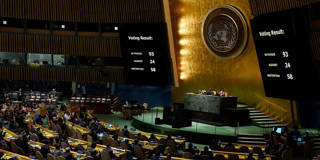As the US and China divide the world into allies and enemies, many smaller countries are resisting pressure to take sides. It is wiser to navigate rising economic nationalism without unconditionally adopting the foreign-policy preferences of superpowers.
OXFORD – Critics of geopolitical non-alignment have long characterized it as a flawed and doomed policy, and in the wake of Russia’s invasion of Ukraine, non-alignment is rapidly falling out of favor. After all, Ukraine was invaded because it was not a member of NATO, causing Sweden and Finland to abandon their long-held neutrality and apply to join.
But non-alignment, or the refusal to ally with any major power unconditionally, may be necessary to restrain the world’s superpowers. Otherwise, their increasing nationalism could lead to a global order antithetical to the interests of all other countries.
Economic nationalism is on the rise among the world’s major superpowers. A 2019 report by the Peterson Institute for International Economics highlighted then-US President Donald Trump’s advocacy of protectionism, restrictions on inward foreign investment and immigration, and rejection of multilateral constraints. Previously, the United States offered allies its commitment to a rules-based international order and shared security, which President Joe Biden’s administration seeks to restore. But Trump’s “America First” narrative has changed that offer, and many Republican candidates in November’s midterm elections are vowing to weaken it further.

OXFORD – Critics of geopolitical non-alignment have long characterized it as a flawed and doomed policy, and in the wake of Russia’s invasion of Ukraine, non-alignment is rapidly falling out of favor. After all, Ukraine was invaded because it was not a member of NATO, causing Sweden and Finland to abandon their long-held neutrality and apply to join.
But non-alignment, or the refusal to ally with any major power unconditionally, may be necessary to restrain the world’s superpowers. Otherwise, their increasing nationalism could lead to a global order antithetical to the interests of all other countries.
Economic nationalism is on the rise among the world’s major superpowers. A 2019 report by the Peterson Institute for International Economics highlighted then-US President Donald Trump’s advocacy of protectionism, restrictions on inward foreign investment and immigration, and rejection of multilateral constraints. Previously, the United States offered allies its commitment to a rules-based international order and shared security, which President Joe Biden’s administration seeks to restore. But Trump’s “America First” narrative has changed that offer, and many Republican candidates in November’s midterm elections are vowing to weaken it further.